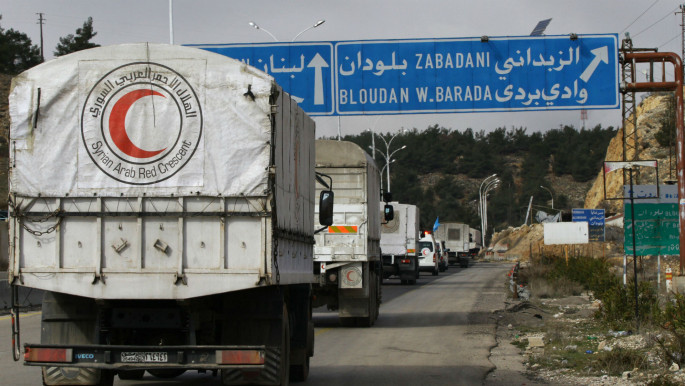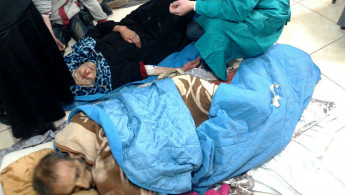New aid reaches besieged towns of Madaya and Zabadani
The UN, International Committee of the Red Cross [ICRC] and Syria's Red Crescent [SARC] said in a joint statement that simultaneous deliveries reached the towns on Monday.
They said fuel had entered Foua and Kafraya, which are under rebel siege, and Madaya, which is under a government siege.
Food and medicine was also delivered to the rebel-held town of Zabadani, which was not included in similar aid deliveries to Foua, Kafraya and Madaya this month.
The statement said however that a joint delegation of aid officials was not able to enter Foua and Kafraya to carry out assessments of humanitarian needs.
"The joint team had to postpone the mission to Foua and Kafraya upon receipt of reports from armed groups that more time was needed to finalise security arrangements in areas under their control," the statement said.
The spokesman for the United Nations Office for the Coordination of Humanitarian Affairs said: "[The aid] was slightly delayed due to several issues - one of them was the weather – it's getting increasingly cold and difficult to move around in Syria so there are many, many obstacles to this but the operation continues."
He described the situation in the eastern part of Syria as "extremely grave" and "catastrophic".
 |
|
| Aid convoys have made new deliveries on Monday [Getty] |
All four towns were part of an agreement last year to end fighting and allow the entry of humanitarian aid.
But access to the towns has been fraught, and there have been reports particularly from Madaya that civilians have starved to death under siege.
There have also been reports of deaths from lack of medical supplies in Foua and Kafraya, though the government has been able to airdrop some supplies to the towns, a capacity rebels do not have.
Some 42,000 civilians are believed to be in Madaya, with fewer than 1,000 in Zabadani and some 20,000 in Foua and Kafraya.
At least five people have starved to death in the Syrian town of Madaya in the past five days, even after a large aid convoy was allowed to enter the town, an international NGO has said.
Last week, an infant starved to death in the Syrian town of Moadamiyeh, ten kilometres southwest of Damascus, which is under government siege.
According to Doctors Without Borders [MSF] in Madaya, by Friday afternoon at least 35 people had been confirmed to have died from starvation since December.
A further 18 people - ranging from a seven-month-old girl to a 70-year-old woman - are believed to be in critical condition and need to be evacuated immediately, MSF said on Sunday.
After the September deal, an initial aid delivery was made, but no subsequent assistance was allowed in until January 11, after reports of deaths in Madaya raised international concern
A second convoy of food and medicine entered Madaya, Foua and Kafraya on January 14, but the UN, ICRC and SARC have called for continuous access to all four besieged towns.
Aid groups have also warned that residents suffering from malnutrition and illness need to be evacuated from the towns.
Statistics vary widely, but sieges and starvation tactics have both been widely employed during the almost five-year-long bloody conflict in which more than 260,000 people have been killed and millions displaced.
The UN puts the current number of Syrians besieged at 393,700 while a monitoring network has said the figure stands at more than a million. MSF puts the figure at close to two million.
Last week, UN Secretary-General Ban Ki-moon urged all sides in Syria's war to protect civilians and warned that "the use of starvation as a weapon of war is a war crime."
Agencies contributed to this report





 Follow the Middle East's top stories in English at The New Arab on Google News
Follow the Middle East's top stories in English at The New Arab on Google News
![The UAE is widely suspected of arming the RSF militia [Getty]](/sites/default/files/styles/image_330x185/public/2024-11/GettyImages-472529908.jpg?h=69f2b9d0&itok=Yauw3YTG)
![Netanyahu furiously denounced the ICC [Getty]](/sites/default/files/styles/image_330x185/public/2024-11/GettyImages-2169352575.jpg?h=199d8c1f&itok=-vRiruf5)
![Both Hamas and the Palestinian Authority welcomed the ICC arrest warrants [Getty]](/sites/default/files/styles/image_330x185/public/2024-11/GettyImages-2178351173.jpg?h=199d8c1f&itok=TV858iVg)